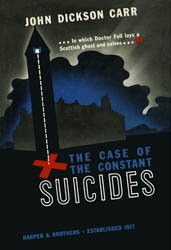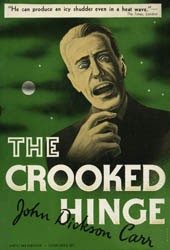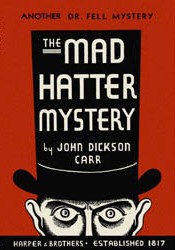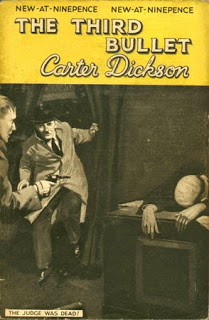
A whodunit or whodunnit is a complex, plot-driven variety of a detective story in which the puzzle regarding who committed the crime is the main focus. The reader or viewer is provided with the clues from which the identity of the perpetrator may be deduced before the story provides the revelation itself at its climax. The investigation is usually conducted by an eccentric, amateur, or semi-professional detective. This narrative development has been seen as a form of comedy in which order is restored to a threatened social calm.

John Dickson Carr was an American author of detective stories, who also published using the pseudonyms Carter Dickson, Carr Dickson, and Roger Fairbairn.
The "locked-room" or "impossible crime" mystery is a subgenre of detective fiction in which a crime is committed in circumstances under which it was seemingly impossible for the perpetrator to commit the crime or evade detection in the course of getting in and out of the crime scene. The crime in question typically involves a crime scene with no indication as to how the intruder could have entered or left, for example: a locked room. Following other conventions of classic detective fiction, the reader is normally presented with the puzzle and all of the clues, and is encouraged to solve the mystery before the solution is revealed in a dramatic climax.

Dr Gideon Fell is a fictional character created by John Dickson Carr. He is the protagonist of 23 mystery novels from 1933 through 1967, as well as a few short stories. Carr was an American who lived most of his adult life in England; Dr. Fell is an Englishman who lives in the London suburbs.

The Case of the Constant Suicides, first published in 1941, is a detective story by John Dickson Carr. Like much of Dickson Carr's work, this novel is a locked room mystery, in addition to being a whodunnit. Unlike most of the other Dr. Fell novels, this story has a high humour level, reminiscent of the Henry Merrivale works.
Edward Dentinger Hoch was an American writer of detective fiction. Although he wrote several novels, he was primarily known for his vast output of over 950 short stories.

He Who Whispers is a mystery novel (1946) by detective novelist John Dickson Carr. Like Many of the works by this author feature so-called impossible crimes. In this case, the novel falls into a smaller category of Carr's work in that it is suggested that the crime is the work of a supernatural being. The detective is Dr. Gideon Fell, who ultimately uncovers a rational explanation for the novel's events. Carr considered this one of his best impossible crime novels.

The Crooked Hinge is a mystery novel (1938) by detective novelist John Dickson Carr. It combines a seemingly impossible throat-slashing with elements of witchcraft, an automaton modelled on Maelzel's Chess Player, and the story of the Tichborne Claimant. It was dedicated to fellow author Dorothy Sayers "in friendship and esteem."
Joseph Commings was an American writer of locked room mysteries. He wrote a series of soft-core sex novels, but is best known for his locked-room mystery/impossible crime short stories featuring Senator Brooks U. Banner."

The Problem of the Wire Cage, first published in 1939, is a detective story by John Dickson Carr featuring his series detective Gideon Fell. This novel is a mystery of the type known as a locked room mystery.

To Wake the Dead, first published in 1938, is a detective story by John Dickson Carr featuring his series detective Gideon Fell. This novel is a mystery of the type known as a whodunnit.

The Dead Man's Knock, first published in 1958, is a detective story by John Dickson Carr which features Carr's series detective Gideon Fell. This novel is a mystery of the type known as a locked room mystery.

The Man Who Could Not Shudder, first published in 1940, is a detective story by American writer John Dickson Carr featuring his series detective Gideon Fell. It is mystery novel of the locked room mystery type, more properly a subset of the locked room mystery called an "impossible crime" story.

The Black Spectacles, first published in 1939, is a detective story by John Dickson Carr featuring his series detective Gideon Fell. This novel is a mystery of the type known as a locked room mystery.

Till Death Do Us Part, first published in 1944, is a detective story by John Dickson Carr featuring his series detective Gideon Fell. This novel is a mystery of the type known as a locked room mystery. Carr considered this one of his best impossible crime novels.

The House at Satan's Elbow, first published in 1965, is a detective story by John Dickson Carr featuring his series detective Gideon Fell. This novel is a mystery of the type known as a locked room mystery. It was dedicated to his fellow mystery writer Clayton Rawson "because of our mutual interest in tricks and impossibilities".

The Mad Hatter Mystery, first published in 1933, is a detective story by American writer John Dickson Carr, featuring his series detective Gideon Fell. This novel is a mystery of the type known as a whodunnit.

In Spite of Thunder, first published in 1960, is a detective story by John Dickson Carr which features Carr's series detective Gideon Fell. This novel is a mystery of the type known as a locked room mystery.

The Third Bullet is a novel by Carter Dickson, first edited in the United Kingdom in 1937.
Death-Watch, first published in April 1935, is a detective story by American writer John Dickson Carr, featuring his series detective Gideon Fell. It is a mystery novel of the whodunnit type.















